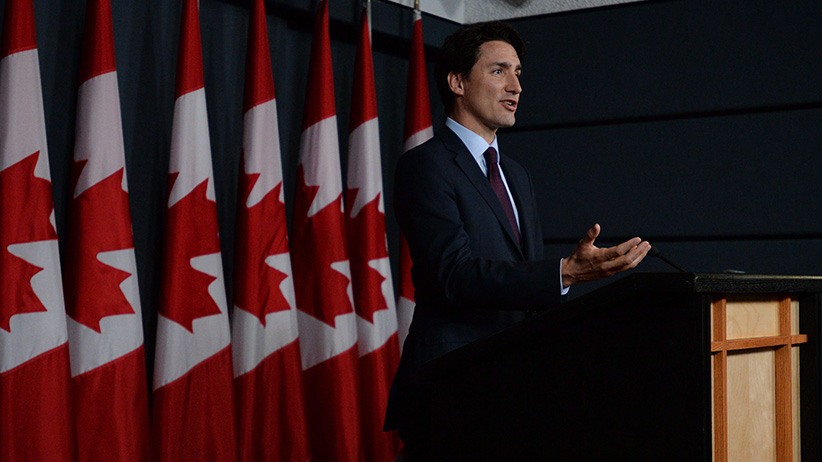Why didn’t Trudeau want to link the Fort Mac fire to climate change?
Justin Trudeau doesn’t like the link, but it’s hard to refute—and it’s hardly political to raise it
The Peace Tower is framed in an archway on the East Block of Parliament Buildings on Parliament Hil in Ottawa, Thursday September 10, 2009. Opposition MPs, and even some Conservatives, agree Canada’s parliamentary committee system is broken.They just don’t agree on what’s gone wrong or who’s to blame. THE CANADIAN PRESS/Adrian Wyld
Share
Prime Minister Justin Trudeau obviously anticipated being asked at his news conference today about the connection between climate change and the forest fire that had already wreaked such devastation on Fort McMurray, Alta., and hadn’t yet burned out or been stopped.
And so, in his usual fashion, Trudeau responded adroitly to the most awkward possible question of the hour, doing his best, which is pretty good, to deflect discussion in the National Press Theatre away from global warming and back to what’s being done to help a community that sure needs it.
Still, he didn’t dispute the uncomfortable fact that climate experts have long seen more frequent, more intense fires in the boreal forest as an unavoidable result of global warming. “It’s well known that one of the consequences of climate change will be a greater prevalence of extreme weather events around the planet,” he said.
But Trudeau went on right away to caution anyone against trying “to make a political argument out of one particular disaster.” He must have meant connecting the dots from Fort McMurray as the oil sands capital, to fossil-fuel burning as the main cause of climate change, to forest fires. Yet it’s not clear, at least not to me, how talking about that science automatically amounts to advancing a political argument.
Related: Did climate change contribute to the Fort McMurray fire?
It wouldn’t be political point-scoring, for instance, to quote from a 2004 academic report, published in the not-especially political journal Geophysical Research Letters, that begins: “The area burned by forest fires in Canada has increased over the past four decades, at the same time as summer season temperatures have warmed.” The paper, written by University of Victoria and Canadian government researchers, concludes that “human-induced climate change has had a detectable influence on the area burned by forest fires in Canada over recent decades.”
It isn’t just that climate change will result in more bad fires in the future—it’s already been happening for decades. This is worth considering when you consider how Trudeau framed the issue today. “There have always been fires, there have always been floods,” he said. “Pointing at any one incident and saying, ‘This is because of that,’ is neither helpful nor entirely accurate.”

I haven’t heard anyone claim that the Fort McMurray fire was directly and only attributable to climate change. If somebody did, that sure wouldn’t be helpful or accurate. But it would be helpful and accurate to mention that the International Panel on Climate Change’s 2014 summary report for policy-makers asserted with “high confidence” that North America is in for more “wildfire-induced loss of ecosystem integrity, property loss, human morbidity, and mortality as a result of increased drying trend and temperature trend.”
The Prime Minister urged us to think, not about those trends, but about the dire human situation at hand. “We need to separate a pattern over time from any one event,” he said. “What we are focused right now on is giving the people of Fort McMurray and across Alberta the kind of support they need right now, and in the months and, indeed, years ahead as we all rebuild.”
The immediate needs of the people of Fort McMurray must of course be the government’s focus right now. But, since Trudeau mentions a timeline stretching out over years, it’s hard not to contemplate the permanently more threatening situation faced by Fort Mac and any Canadian town surrounded by trees. “The predictions for the future are that the fire season is going to become longer, it’s going to start earlier, and the fires are going to be more severe,” David Andison, an adjunct forestry professor at University of British Columbia, told me.
Related: Want to help those fleeing Fort McMurray? Here’s how.
Andison isn’t an expert on climate. He is a specialist in the ecology of forested landscapes. As a consultant, he advises companies and municipalities. With the forest fire danger growing, he said communities might want to start emulating Jasper, Alta.’s “FireSmart-ForestWise” program for carefully managing its surrounding forest to make it harder for fires to start and spread. Grooming whole forests that way seems expensive. But weighed against the rebuilding costs that Fort McMurray faces in the years ahead, Andison said, “I think the economics start to look pretty good.”
And this is the other side of thinking about Fort McMurray’s terrible loss in terms of climate change. It’s not just a matter of the disaster serving as a reminder of the case for serious measures to combat global warming. It’s also about what we will have no choice but to start doing, and doing at significant cost, if those efforts fail.
